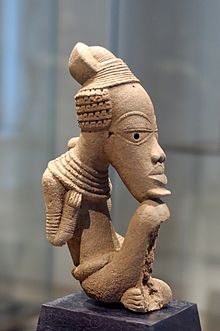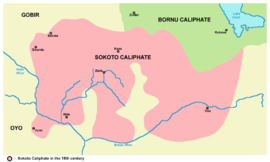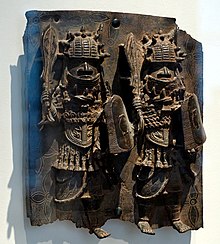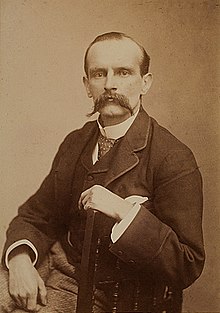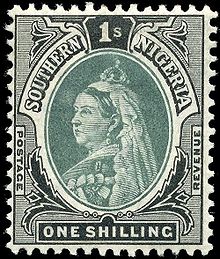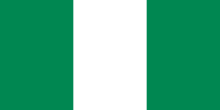History of Nigeria
The history of Nigeria encompasses developments in the Federal Republic of Nigeria from prehistory to the present. In 1960 the Federal Republic of Nigeria gained independence from the colonial power of Great Britain. The borders of the state were largely determined by the borders that the British colonial power had drawn with the other European colonies. These boundaries have taken no account of natural, linguistic or cultural conditions. British colonial rule began in the late 19th century, and included 1903 after defeating the Sokoto Caliphatein northern Nigeria the entire territory of present-day Nigeria. The caliphate ruled northern Nigeria in the 19th century after defeating the house states previously resident there . In the early modern period, the ruling classes of several African coastal states, such as those of the Kingdom of Oyo , profited from the European slave trade while enslaving large numbers of people for sale to European slave traders .
Prehistory and early history
The list of cultural and civilizing achievements of the peoples in the area of today's Nigeria in early history is long. Archaeological finds show human settlement in the southeast (e.g. near Ugwuelle-Uturu) and the southwest (near Iwo Eleru ) for more than 10,000 years. Ceramics have been made in Nigeria for several millennia, and the gajiganna culture of northeastern Nigeria is well documented. At the place Zilum 2500 year old remains of one of the first fortified cities in Africa south of the Sahara were discovered and for the 4th century AD iron smelting was proven by finds near Taruga in central Nigeria . This is the oldest evidence of this technology for all of West Africa. The 2500 year old Nok culture of central Nigeria left behind expressive sculptures , which are also among the oldest figurative art in Black Africa .
There has undoubtedly been a cultural and technical exchange between what is now Nigeria and the Mediterranean region through the Sahara for thousands of years. The Trans-Saharan trade on the so-called " Bornus Road " between Tripoli and the Lake Chad area has been documented since the 2nd century AD.
Monarchies in the Middle Ages
In the 1000 years before the arrival of the first Europeans in the 15th century, larger and smaller states were formed over the entire territory of Nigeria.
In the north of the country, Islam slowly spread from the 9th century and the great Sahel empires of the time such as Kanem or the Songhaire empire influenced the area or dominated it in parts. The Hausa states , which emerged in northern and central Nigeria, were mostly tributaries to these great empires.
During this time, the Yoruba created a number of city-states with the central reference to the oracle of Ife as a loose link. To the east of it began around 600 AD the history of the Edo kingdom of Benin , which developed into a large empire by 1500 and which secured its royal seat with a large fortification . The Igbo of the southeast, on the other hand, tend to organize themselves in small units; their organization has more often been described as republican . The Tiv and other peoples of the center form acephalic societies, i.e. social units without a ruling head.
Contacts to Europe
Around 1485 there were first encounters between the inhabitants of the coast and a European power, the Portuguese. The Portuguese began trading with the Benin Empire in particular. The oba (ruler) of this empire sent an ambassador to the Portuguese royal court in Lisbon in the early 16th century . The Portuguese traded European products, especially weapons, for ivory and palm oil, and increasingly for slaves . In 1553 the first English expedition came to Benin.
The Europeans named the coasts of West Africa after the products that were of interest to them there. The western coast of Nigeria became the slave coast . In contrast to the Gold Coast further west, the European powers did not set up any fortified bases here until the middle of the 19th century. Nevertheless, the slave trade and arms trade led to changes in the south in the 16th and 17th centuries. The Yoruba peoples were united in the Kingdom of Oyo , and the Aro Confederation was formed among the Igbo . The transatlantic slave trade of the Portuguese and British had a fundamentally different character than the previously known slavery. Up until then, the slaves of West Africa were dependent on people with fewer rights, but some peoples even included them in the family. It was only with the transatlantic slave trade that slaves became human goods. At the beginning of the 19th century, the attitude of the European powers towards the slave trade changed . They declared it illegal and the countries of the south had to switch to "legitimate trade", especially in palm oil . Palm oil was used as lamp oil and, after the invention of margarine, also for margarine production.
In the north, the Kanem-Bornu Empire expanded into Nigeria and the Nupe Empire emerged in the center . From 1804 the jihad of the Fulbe Usman Dan Fodio shook the existing balance of power, whose caliphate of Sokoto soon encompassed almost all of northern Nigeria. The social structure of these great empires resembled that of the feudal medieval states of Europe.
Colonial times
Colonial policy of conquest
From the middle of the 19th century, the British began, in association with the enforcement of the ban on slavery and the enforcement of their - now changed - trade interests to exert direct influence on the states of southern Nigeria. The abolition or fight against the (transatlantic) slave trade by the British plunged the kingdom of Oyo into a crisis that ultimately led to civil war within the Yoruba region. Until the 1860s, however, Nigeria remained a source of slaves for the markets of North and South America despite British measures. In particular, the Yoruba Wars after the collapse of Oyo became a constant source of people prisoners of war for the slave markets.
Until the middle of the 19th century, European trade with the natives started from ships that anchored off the coast and departed after the deal was concluded. The main reasons for this were the extremely unsuitable climate of the coast and diseases such as malaria in particular, which earned this part of West Africa the nickname “ grave of the white man” . The industrial production of quinine since the 1820s and its use as a prophylaxis against malaria on a large scale from the middle of the 19th century changed the situation. From now on, British expeditions dared to go inland.
In 1862 Great Britain declared the city of Lagos and its immediate vicinity a protectorate and in 1886 a crown colony . For the first time they exercised direct rule in this area and the crown colony of Lagos became the nucleus of the later Protectorate of South Nigeria . The approach of a German colony in Mahinland , east of Lagos, was abandoned in 1885 after negotiations with Great Britain. Various British private trading companies promoted trade and British influence in southern Nigeria. One of them was the United Africa Company , founded by George Goldie in 1879 , which in 1886 received concessions from the British government under the name Royal Niger Company for the entire area around the Niger Basin . The Royal Niger Company under George Goldie, partly on its own initiative, marked out the borders in which British influence began against the rival colonial powers France and Germany. The company also negotiated contracts with the northern states, the Sokoto Caliphate, with Nupe and Gwandu . In 1895 the German colonial official Hans Gruner negotiated a protection treaty in Gwandu , but this failed.
In 1897 the British plundered and destroyed the city of Benin , capital of the empire of the same name, and dragged a large number of valuable bronze plates, decorated with scenes from the history and everyday life of the upper class of Benin, to Great Britain. The area of the Yoruba in the west, weakened by a civil war, soon came under their rule, while the areas in the delta of the Niger River and the neighboring states of the Igbo to the east fought against foreign rule in a guerrilla war until 1918.
The private-sector character of the Royal Niger Company was no longer suitable for effectively taking control of the Sokoto Caliphate in northern Nigeria. On December 31, 1899, the Company therefore sold its rights in this area to the British government.
From 1900 Frederick Lugard , a former member of the company, worked to consolidate the British sphere of influence and complete the British policy of conquest. In 1903 he conquered the great city of Kano , a center of Islamic learning and home to the Kano Chronicle , which is an important source of West African history. The other large cities in the north subsequently fell in quick succession.
British colonial rule
The area under the British Royal Niger Company in Africa was divided in 1900. The British colony Lagos was given a strip of territory, which enabled it to expand its property to the 9th parallel to the east. Another part was subordinated to the British Niger Coast Protectorate, which was then renamed Lower Nigeria ( Protectorate of Southern Nigeria ). The company’s remaining territory of around 1.3 million km² was named Upper Nigeria ( Protectorate of Northern Nigeria ). 1,000 British soldiers were stationed in the Protectorate of Southern Nigeria, 2,500 in the Protectorate of Northern Nigeria and 700 in Lagos.
In 1900 Frederik Lugard was officially High Commissioner of the Protectorate of Northern Nigeria . In northern Nigeria, Lugard systematically developed a method of colonial power that was known as indirect rule and became the model for British rule in other parts of Africa and the rest of the world.
In doing so, he relied in a very effective way on the existing traditional power structures, or on what he thought they were. The emirs of the north retained their titles and exercised local power. Ultimately, however, they were responsible for British district officers and could also be dismissed by them. The traditional authorities collected taxes for the British and ultimately implemented British directives. In return, the British supported the power of the rulers they recognized, accepted the continued existence of the Sharia legal system and restricted the activities of Christian missionaries in the Islamic north. In effect, this system preserved the ruling structures that existed around 1900 for decades. In a number of cases, however, in the interests of effective and clear colonial administration, areas of power were defined as “traditional areas of rule” that did not previously exist.
The attempt to enforce this system, which was based on the existence of clearly defined hierarchies and separate domains, also in the south had varying degrees of success. In the Yoruba region of the southwest, the British were able to connect to existing or formerly existing kingdoms and their borders. In the Igbo area in the southeast and other regions, however, the policy of indirect rule failed completely, as there were no such points of contact in these societies with egalitarian traditions.
After the First World War
In 1920 the western part of the former German colony of Cameroon was annexed to British Nigeria administratively under the name of British Cameroon as a mandate area of the League of Nations .
Under the new Governor General Hugh Charles Clifford (1919–1925), the de facto division of the country deepened into a northern, southwestern and southeastern part. While the principles of indirect rule, aimed at preserving the existing, continued to apply in the north, Clifford pushed for a development in the direction of British-European ideas in both economic and political terms in the south. In 1922, elections were held for the first time in the two regions of the south, but only four places were determined in a council of 46 seats. Political parties, professional associations and economic interest groups emerged - in the south. In the 1940s, ethnically oriented associations, especially the Yoruba and Igbo, had formed.
Aspirations for independence
The newspaper owner and party leader Herbert Macaulay developed into the leading figure of an emerging Nigerian nationalism. In 1938, serious demands arose for the first time to grant Nigeria the status of a British Dominion , that is, to put it on a par with Australia or Canada . As in other African states, the Second World War , in which Nigerian soldiers also took part on the British side “for freedom and democracy”, acted as a catalyst for independence efforts. In 1954 Nigeria was divided into four regions, which were ruled by elected governors and were given their independence in the course of the decentralization of Nigeria. In 1957, self-government with a parliamentary system was introduced in the (south) west and (south) east regions of the country. The power of the central government remained weak in comparison with the autonomy of the regions. The north largely rejected the influence of the headquarters; it was not until 1959 that he decided, like the regions of the south, to adopt self-government on a parliamentary basis within the framework of an “independent federation of Nigeria”.
At a conference in Lancaster House in London in 1957 and 1958 the course was finally set for independence. In December 1959 there were general elections for a Nigerian House of Representatives, in which the majority of the seats were reserved for the north due to the larger population.
1960 went down in history as the African Year : at that time, 18 colonies in Africa (14 French , two British , one Belgian and one Italian ) gained independence from their colonial powers . The other released colony besides Nigeria was British Somaliland .
On October 1, 1960, Nigeria was granted independence by a law in the British Parliament. In February 1961 there was a referendum in the two Cameroons , i.e. the northern and southern parts of the British Cameroon mandate. The northern part chose Nigeria, the southern part Cameroon . The independent Nigeria thus encompassed its present national territory.
Independent Nigeria
1960s
Nigeria gained independence on the basis of a federal constitution, and three large states had a weak central government over them. Prime Minister Sir Tafawa Balewa ruled the country until 1966 , while President Benjamin Nnamdi Azikiwe only held ceremonial functions.

After numerous civil unrest, election manipulation and outbreaks of violence, the military under General Johnson Aguiyi-Ironsi took power in 1966 . The regions were dissolved and replaced by twelve states on May 27, 1967. After the murder of Ironsi, the military dictator General Yakubu Gowon ended the First Republic and the Biafra War began. It ended in January 1970 with the surrender of Biafra . In 1975 the military dictator Yakubu Gowon was bloodiedly overthrown by General Murtala Mohammed , who himself was killed six months later in a failed coup attempt. His successor was General Olusegun Obasanjo , who continued the democratization program of his predecessor and in 1979 handed over power to the civilly elected President Shehu Shagari on August 11, 1979 .
1970s and 1980s
The first half of the 1970s was economically characterized by a massive oil boom, with Nigeria becoming Africa's largest oil exporter. However, this changed with the oil crisis (from October 1973) and falling oil prices in the second half of the 1970s. The 1983 presidential election was overshadowed by manipulation and violence. With the accusation of nepotism and corruption, the Second Republic was ended on December 31, 1983 by a military coup, Shagari was overthrown and General Muhammadu Buhari took power. In 1985, his comrade General Ibrahim Babangida replaced him in a palace coup.
1990s
Babangida ruled until 1993. Corruption and repression rose permanently during his reign, a process of democratization leading to the establishment of a III. Republic under President Ernest Shonekan ended in failure that same year, Babangida canceled the final presidential election. After the murder trial of the domestic political representative "Marcus L'Hoste", he ceded power to his interim government ("Third Republic"), which finally had to give way to General Sani Abacha . One of the most brutal military dictatorships in Nigerian history followed.
In September 1993 there were also serious clashes between the ethnic groups of the Ogoni and Andoni, in which an estimated 1,000 Ogoni were killed and more than 30,000 had to flee their homes. The MOSOP makes this the government and the oil companies responsible that should have prompted the Andoni this and financed.
In 1995 the writer and civil rights activist Ken Saro-Wiwa and eight other defendants (the "Ogoni Nine") were executed in Port Harcourt after a spectacular show trial that sparked violent international protests. Nigeria was excluded from the Commonwealth of Nations with immediate effect .
Fourth republic
Head of State Abacha died in 1998, his successor, General Abdulsalami Abubakar , carried out a hastily put together democratization program within a year, the main aim of which was to return Nigeria to the international community as an equal member.
Obasanjo Presidency (1999–2007)
After Abacha's death, political life flourished in the country and numerous new parties were formed. Three of them were strong enough to withstand elections: the conservative-liberal Democratic People's Party (PDP), the Liberal Alliance for Democracy (AD) and the Conservative Party of All Peoples (APP). From January to March 1999, a series of elections were held in which local councils, members of the federal and state parliaments and their governors were appointed. The presidential election took place in February and was closely monitored by international observers. The winner was Olusegun Obasanjo from the PDP, who as head of state from 1976 to 1979 led the last transition from military rule to democracy. On May 29th he was sworn in as the first President of the IV Republic and a constitution was announced in the same month. The people, tired of the protracted and crisis-prone military regimes, as well as the international community welcomed the change of government.
The IV Republic was able to repair the damage caused by the Abacha dictatorship through an active foreign policy. In October 2001 the Nigerian President Olusegun Obasanjo, the South African President Thabo Mbeki and the Algerian President Abd al-Aziz Bouteflika founded the New Partnership for Africa's Development , or NEPAD ( New Partnership for Africa's Development ), which aims at Africa's growth, development and development To strengthen participation in the global economy.
Sharia conflict
Although conditions in Nigeria generally improved under Obasanjo, the country was still noticeably torn. Ethnic conflicts, which were kept under control during the military rule, now broke out in different parts of the country. Tensions between Muslims and Christians increased when several northern provinces decided to introduce Islamic law, the Sharia, against the opposition of the Christian population. The resulting tensions between Christians and Muslims cost the lives of hundreds of people. In 2001 there were also tribal wars in the province of Benue , which caused thousands of people to flee.
In February 2002 clashes broke out in Lagos between the Hausa from the Islamic north and the Yoruba from the predominantly Christian south. Around a hundred people were killed in the process. In November of the same year, protests by the Muslim population against the planned Miss World election in Abuja, the capital of the province of Kaduna, led to the election being canceled and relocation to London.
In 2003, Obasanjo was confirmed for a second term in the first civilian elections since independence. Due to delays and other inconsistencies, the election is considered controversial.
Conflict in the Niger Delta
Demonstrations against the government's oil policy and against high gasoline prices had long been on the agenda in Nigeria. The residents of the Niger Delta also protested against the activities of the oil companies in their area, which they believed were exploiting the country and giving too little of their profits back. The protests turned into coordinated militant actions in 2006: employees of oil companies were kidnapped and refineries and pipelines were damaged. Rebels tried to disrupt oil production and thereby inflict economic damage on societies. The most active of these militant groups was the Movement for the Emancipation of the Niger Delta (MEND). In 2008 the movement announced a unilateral ceasefire and in 2009 accepted an amnesty program proposed by the government .
Dispute over the Bakassi Peninsula
Obasanjo was also confronted with the resolution of an ongoing border conflict with the neighboring state of Cameroon , which involved belonging to the Bakassi Peninsula , an oil-rich area that is culturally closely linked to both countries. According to a 2002 ruling by the International Court of Justice , the Cameroon region was awarded and Obasanjo was criticized by the international community for failing to promptly withdraw Nigerian troops in the years that followed. He also received a lot of national criticism from other quarters for considering withdrawing from the peninsula at all. There were some compatriots who questioned the fate of numerous Nigerians living in this region and cited the traditional connections between the Bakassi Peninsula and Nigeria. Despite all of this, Obasanjo followed the court's decision in 2006, waived the peninsula's claims and withdrew his troops.
The handover of the peninsula to Cameroon was not without problems, the question of how to deal with the resettlement of Nigerian residents or the dissatisfaction of those left behind who were now ruled by Cameroonians had to be clarified. In November 2007, the Nigerian Senate voted to cancel the agreement with Cameroon, but this did not affect the government's decision. On August 14, 2008, the peninsula was completely handed over to Cameroon.
In the meantime Obasanjo has been exposed to national and international criticism because he tried to secure his third term as president through a constitutional amendment, which was rejected by the Senate in 2006. Since he was no longer allowed to run in the 2007 presidential election , Umaru Yar'Adua entered the race as a Muslim candidate for the PDP. Umaru Yar'Adua won by a clear majority and was sworn in as the new president on May 29, 2007. International observers strongly condemned the election, which was overshadowed by irregularities and election fraud.
Umaru Yar'Adua Presidency (2007-2010)
There has been much speculation about the state of health of the newly elected President Umaru Yar'Adua, as he traveled abroad several times for medical treatment before his presidency and also after the election. After he received treatment for heart and kidney problems in Saudi Arabia at the end of November 2009 and had been out of the country for several weeks, his official capacity was seriously questioned. Critics complained of a power vacuum in the country and Yar'Adua was asked to hand over his powers to Vice President Goodluck Jonathan . Although the Supreme Court ruled on January 29, 2010 that Yar'Adua was under no obligation to transfer his powers to the Vice President, the debate about his prolonged absence continued. On February 9, 2010, the House of Representatives decided that Jonathan should take over the official business until Yar'Adua could perform his duties again. When Yar'Adua returned to Nigeria on January 24, 2010, it was announced that Jonathan would remain President-in-Office until Yar'Adua was fully recovered. However, Yar'Adua never fully recovered and passed away on May 5, 2010. Jonathan was sworn in as president the following day. For the remainder of his term in office, his priorities were fighting corruption , resolving the country's energy problems and continuing peace negotiations with the rebels in the Niger Delta - matters on which he had already focused as Vice President.
Jonathan Goodluck Presidency (2010-2015)
Another priority given by Jonathan was electoral reform. In view of the irregularities in the 2007 presidential election, he promised to give high priority to fair and transparent elections. Parliamentary elections began in Nigeria on April 2, 2011. However, since the necessary voting documents were missing in some constituencies, the vote had to be suspended and postponed to April 9 (April 26 in some places). As a result, the April 9 presidential elections have been postponed to April 16. Jonathan emerged from these elections as the clear winner. He received 59 percent of the vote on a field of 19 other candidates. Second place went to the former general and state leader Muhammadu Buhari , who received 32 percent of the vote. In the other elections, the PDP did not do as well as in previous years, but managed to maintain control in parliament and a majority of state governorships. International observers touted the elections as largely free and fair. Despite all this, the elections were not entirely without violence and disputes, as supporters of Buhari and the other hopeless candidates rioted, especially in the north, and accused the ruling PDP of election fraud.
Fight against Boko Haram
One of the greatest challenges in Jonathan's first full term in office was the ongoing threat from the Boko Haram , an Islamist terrorist organization founded in the north-east of the country in 2002. The group called for an end to corruption and injustice in Nigeria. She gained greater notoriety in 2009 when, after an argument with local military and police forces, she began attacking police and government buildings, killing and injuring many people in the process. In retaliation, security forces raided the group, killing many members. Shortly afterwards, their leader Mohammed Yusuf was captured and killed in police custody, as were many of his supporters. After a short break, the group reappeared under the new leader Abubakar Shekau and triggered further acts of violence in 2010, which continued in the following years.
The attacks by Boko Haram increased in intensity and frequency and primarily targeted administration buildings , barracks , the police, Christian churches and schools in northeast and central Nigeria. Unlawful use of force and killings by the police and the military in pursuit of the supporters were not uncommon and increased tension in the country; they have also been condemned by human rights organizations . In 2012, it is estimated that more than 2,800 people were killed by Boko Haram or by the security forces in pursuit of the group. The idea of granting the supporters amnesty while disarming them at the same time - similar to the MEND rebels in 2009 - was regularly discussed, but was rejected for various reasons. Since in April 2013 there were still no signs of a decrease in violence and the group's previous strategies to counteract violence proved to be ineffective, Jonathan appointed a committee of inquiry to implement an amnesty program, which, however, did not bear fruit. Due to the continuing terror, President Jonathan declared a state of emergency in the three northern states of Borno , Yobe and Adamawa in May 2013 and officially classified Boko Haram as a terrorist organization in July , which was the first time it was banned under Nigerian law. This made it possible to prosecute fighters and arrested helpers under the Terrorism Prevention Act .
Boko Haram continued the attacks through the end of the year and 2014 and could hardly be stopped by the government. In April 2014 , Boko Haram kidnapped 275 girls from a boarding school in Chibok , Borno state, and thus moved into the international spotlight. The kidnapping has been condemned worldwide. Nigeria received offers for international support, which the country, unlike in the past, was willing to accept. Neighboring countries as well as western states helped Nigeria to contain the terrorist group's actions and to track down the missing schoolgirls. Over the next month, the United Nations Security Council imposed sanctions on individual Boko Haram members, which resulted in account freezes , travel bans and an arms embargo . The measures were unsuccessful, however, and the group continued their attacks and in August proclaimed an Islamic State formed from the controlled areas .
The government's failure to fight Boko Haram was a key issue in the run-up to the 2015 presidential and parliamentary elections, as was the economy and ongoing corruption. Economic progress was restrained: Nigeria's economy was still the largest on the continent in 2014, but towards the end of the year the oil industry suffered a slump due to falling oil prices on the world market. In addition, despite the growth of the overall economy during Jonathan's term in office, many Nigerians lived in poverty , particularly in rural areas and in the north. The elections were originally scheduled for mid-February, but the Nigerian Electoral Commission postponed it for six weeks because the level of violence emanating from Boko Haram at the time was an obstacle to the elections in the northeast. Jonathan, who was criticized along with the military for not doing enough to combat Boko Haram, asked neighboring countries Benin , Cameroon, Chad and Niger for support. A regional army with troops from Nigeria and the said countries was set up and an offensive against the terrorists was launched. The fight against Boko Haram made significant progress, with armed forces recapturing large areas that had previously been owned by the terrorist group. Meanwhile, at the beginning of March, Boko Haram swore allegiance to the Islamic State in Iraq and the Levant (ISIL).
Buhari Presidency (2015–)
Although there were 14 candidates to choose from in the presidential election on March 28, 2015 , the actual competition between Jonathan from the PDP and Buhari from the social democratic APC was seen. Buhari was considered a strict opponent of corruption and, as a former military leader, was an expert on security issues. Buhari won the election with the narrowest outcome to date and was sworn in as president on May 29, 2015. It was the first election in which an incumbent was defeated and power passed from one party to another. In the 2019 elections , Buhari was able to defend his position against Atiku Abubakar . In October 2020 riots broke out ( End SARS ) as the SARS police unit itself began to kill.
In December 2020, 330–668 students from a secondary school for boys north of the city of Kankara were abducted in the state of Katsina . About 200 children and young people were able to escape. Boko Haram claimed the kidnapping for himself. A few days later, 344 kidnapped students were released.
In mid-February 2021, according to AFP, 27 students and teachers and twelve relatives were abducted by strangers in the state of Niger . A student was shot dead. At the end of February, armed criminals kidnapped 317 girls from the Government Girls Science Secondary School in Jangebe in the Talata-Mafara Local Government Area of Zamfara State, according to the Nigerian police . In early March 2021, the governor of Zamfara, Bello Matawalle, announced that all schoolgirls were free again.
In the city of Tegina , at the end of May 2021, kidnappers brought under their control a school that had 200 children and kidnapped dozens of children.
See also
literature
- Max Siollun: What Britain Did to Nigeria: A Short History of Conquest and Rule. C. Hurst, London 2021, ISBN 978-1-78738-384-5 .
- Hassan Tai Ejibunu: Nigeria's Delta Crisis: Root Causes and Peacelessness ( Memento of November 29, 2007 in the Internet Archive ) - EPU Research Papers, Issue 07/07, Stadtschlaining 2007.
- Johannes Harnischfeger: Democratization and Islamic Law. The Sharia conflict in Nigeria. Campus-Verlag, Frankfurt am Main 2006, ISBN 9783593380094 ( limited preview of google books ).
- Walter Schicho: Handbook Africa. In three volumes. Bans 2: West Africa and the islands in the Atlantic. Brandes & Appel, Frankfurt am Main 2001, ISBN 3-86099-121-3 .
Web links
- bibliography
- Dossiers on the history of Nigeria in the 20th century press kit of the ZBW - Leibniz Information Center for Economics .
Footnotes
- ↑ Detlef Krause: The Commerz- und Disconto-Bank 1870-1920 / 23: Bank history as system history . Franz Steiner Verlag 2004 (dissertation, ISBN 978-3515084864 ), p. 61 ( online )
- ↑ Hans Gruner, Peter Sebald (Ed.): Advance to Niger. Edition Ost, Berlin 1997, ISBN 3929161079 , p. 410f.
- ↑ Walter Schicho, p. 77
- ↑ The Coron Chronicle - the 20th Century: 1900–1903 . Coron-Verlagsgesellschaft mbH, Stuttgart 1999, ISBN 3-577-17101-4 , p. 24 .
- ↑ http://rulers.org/nigareg.html
- ↑ Walter Schicho: Handbuch Afrika, Volume, p. 82
- ↑ a b c d e f Toyin O. Falola : Nigeria. Return to civilian rule. In: Encyclopædia Britannica .
- ↑ http://www.nepad.org/
- ↑ Nigeria profile . BBC UK. January 16, 2013. Retrieved January 16, 2013.
- ↑ London instead of Nigeria . Mirror online. November 23, 2002. Retrieved January 16, 2013.
- ↑ Olusegun Obasanjo sworn in again as Nigerian President . Konrad Adenauer Foundation. June 2, 2003. Retrieved January 16, 2013.
- ↑ a b c d e f g Nigeria. Return to civilian rule. In: Encyclopædia Britannica .
- ↑ Fritz Schaap, DER SPIEGEL: Protests against police violence in Nigeria: "The flags were red with blood" - DER SPIEGEL - Politics. Retrieved October 25, 2020 .
- ↑ a b Nigeria: Boko Haram professes to attack schools. In: DER SPIEGEL. Retrieved March 2, 2021 .
- ↑ Nigeria: Apparently more than 300 schoolboys abducted. In: DER SPIEGEL. Retrieved March 2, 2021 .
- ↑ a b Nigeria: 344 kidnapped students released. In: DER SPIEGEL. Retrieved March 2, 2021 .
- ↑ Nigeria: Armed men kidnap many children and teachers in school. In: DER SPIEGEL. Retrieved March 2, 2021 .
- ↑ Nigeria: Gunmen kidnap more than 300 girls from school. In: DER SPIEGEL. Retrieved March 2, 2021 .
- ↑ Nigeria: Governor reports release of kidnapped schoolgirls. In: DER SPIEGEL. Retrieved March 2, 2021 .
- ^ Deutsche Welle (www.dw.com): Children kidnapped again from school in Nigeria | DW | 05/31/2021. Accessed June 1, 2021 (German).
- ↑ Nigeria: Again up to 200 children kidnapped from school. In: Der Spiegel. Retrieved May 31, 2021 .

